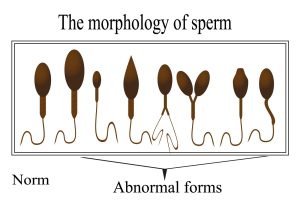Understanding High Sperm Abnormality in Men and Its Impact on Fertility

When it comes to fertility, there’s a lot of talk about women’s health, but male fertility is just as crucial. One of the key factors affecting male fertility is the rate of abnormal sperm, often called “sperm morphology.” This simply means how the sperm look, including their shape and size. According to experts, an abnormality in sperm structure can prevent sperm from effectively reaching and fertilizing an egg, which can make conception much harder. Let’s dive into why sperm morphology matters, what high abnormality rates mean, and what steps men can take to improve it.
What Is Sperm Morphology and Why Does It Matter?
Dr. Charles Jennings, a reproductive health expert, explains that “sperm morphology” is a term used to describe the shape, size, and structure of sperm. Ideally, a healthy sperm has a smooth, oval head and a long, straight tail that helps it swim efficiently. However, many men have sperm with abnormal shapes, such as heads that are too large, tails that are too short, or even sperm that have multiple heads or tails. High rates of abnormal sperm can mean lower chances of the sperm reaching and fertilizing an egg.
In a healthy man, a small percentage of sperm will have abnormalities; this is completely normal. But when the number of abnormal sperm is high, it can affect fertility and make conception harder. In fact, Dr. Jennings notes that even in cases where men have a good sperm count, high abnormality rates can still significantly impact their fertility.
Causes of High Sperm Abnormality Rates
There are several reasons why some men experience higher-than-average rates of abnormal sperm:
- Lifestyle Factors: Smoking, excessive alcohol consumption, and drug use have all been shown to negatively affect sperm health. These habits can create oxidative stress in the body, which damages sperm cells.
- Environmental Toxins: Dr. Lisa Hamilton, an environmental health scientist, points out that exposure to environmental toxins like pesticides and heavy metals can lead to an increase in abnormal sperm. “We are surrounded by chemicals that disrupt our hormonal balance,” she explains. These chemicals can alter the development of sperm cells, leading to more defects in structure and function.
- Health Conditions: Certain health conditions, like diabetes, obesity, and hormonal imbalances, can also contribute to higher rates of sperm abnormalities. Men with conditions affecting hormone production, such as low testosterone, may have increased sperm defects. Additionally, untreated infections, such as those in the reproductive system, can damage sperm quality.
- Heat Exposure: Sperm production is highly sensitive to heat. Spending long hours in hot environments, using laptops directly on the lap, or frequent use of hot tubs can raise the temperature around the testes and reduce sperm quality. Research suggests that when the testes are exposed to heat over time, it can lead to higher rates of abnormal sperm and even reduce overall sperm count.
How Is High Sperm Abnormality Diagnosed?
The most common way to determine sperm morphology is through a semen analysis. During this test, a sample of semen is examined under a microscope to evaluate not only the count but also the size, shape, and motility (movement) of the sperm. Dr. Michael Roberts, a fertility specialist, emphasizes the importance of this test, saying, “A semen analysis gives us a comprehensive view of a man’s fertility health. It helps us identify whether high abnormality rates are affecting his chances of conception.”
A typical analysis will categorize the sperm into normal and abnormal groups. Men are often advised to have several tests done over a period, as sperm quality can fluctuate due to various factors, like stress or temporary illness.
Steps to Improve Sperm Health
The good news is that many factors affecting sperm health are within a man’s control. Here are some expert-backed strategies for improving sperm morphology:
- Adopt a Healthier Diet: Consuming a diet rich in antioxidants can help protect sperm from oxidative damage. Foods like leafy greens, berries, nuts, and fish are packed with nutrients that support sperm health.
- Limit Exposure to Toxins: Whenever possible, reduce contact with harmful chemicals. Avoid using pesticides at home, stay away from unnecessary plastic use, and limit exposure to polluted environments.
- Maintain a Healthy Weight: Obesity has been linked to higher rates of sperm abnormalities, likely due to hormone imbalances. Regular exercise and a balanced diet can support hormonal health, which in turn promotes better sperm quality.
- Quit Smoking and Limit Alcohol: Both smoking and heavy drinking have been directly linked to lower sperm quality. By cutting down on these habits, men can significantly improve their sperm health.
- Manage Stress: High-stress levels can impact hormone production, which affects sperm health. Practices like meditation, regular exercise, and adequate sleep can help reduce stress levels.
- Keep Cool: Since sperm production is sensitive to temperature, men should avoid prolonged heat exposure to the testes. Wearing looser clothing, avoiding hot tubs, and not placing laptops directly on the lap can help.
Final Thoughts
High rates of abnormal sperm are a common issue that can affect a man’s fertility, but it’s not a permanent barrier. By understanding the factors contributing to sperm health and taking proactive steps to address them, men can improve their chances of conception. Expert advice emphasizes the importance of lifestyle changes and environmental awareness in maintaining optimal sperm health.
As Dr. Hamilton puts it, “Men’s health is an essential piece of the fertility puzzle. By recognizing and addressing the factors within their control, men can make a real impact on their fertility outcomes.”


